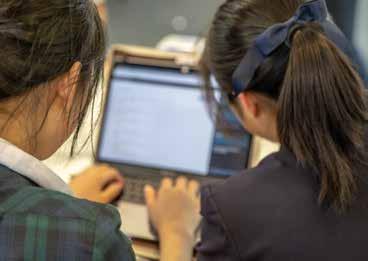TEACHER INQUIRY Enhancing teacher practice By Director of Research and Development, Dr Sarah Loch
Inquiry curious and research fit: Enhancing educational practice through teacher research “Before an educator can marshal the mental energy and commitment to change her practice, it is necessary to become aware of that practice as she is currently engaging in it”, Sue Nichols and Phil Cormack (2017, p. 15).
INTRODUCTION
T
hose who have studied Education at university are likely to have experienced a research subject within their degree, especially at postgraduate level, but when studying to become a teacher we are focused on mastering all we need to be, do and say to create effective learning environments for our students. Once we begin working in our classrooms and with the progression of time, our identities as teachers become more secure. The connection to the school community and the ability to manage multiple situations improves. For many teachers, problem solving and the drive to improve can lead to an interest in conducting research. Rather than focusing solely on issues of teaching and wellbeing, the inquiring practitioner emerges with deeper curiosity around educative processes. Making a contribution to knowledge production is supported when school leaders, teachers and students incorporate practitioner
22
|
Illuminate EDITION 2 2019
research into their approach (Charteris & Smith, 2017) and is driven further when the research process prompts us to think differently about practice and inquiry that we may be replicating, possibly with limited value, without question (Mockler & Groundwater-Smith, 2015). Research is noted as having a positive impact on teacher practice (Nichols & Cormack, 2017). Beyond the value of deepening and expanding one’s skills, the teaching profession now has further motivation to use and conduct research. Formal accreditation for teachers at highly accomplished and lead levels requires competence with conducting research projects. However, teachers’ research skills are typically limited by a lack of experience and access to research training. Teachers also encounter challenges in finding the sustained time required to conduct research. But teachers are typically passionate about inquiring more deeply into how their teaching works and reflecting on opportunities and necessities for improvement and innovation.
But teachers are typically passionate about inquiring more deeply into how their teaching works and reflecting on opportunities and necessities for improvement and innovation.” accountability required across all sectors of academic, social and emotional growth for our students (Lytle & Cochran-Smith, 2009). This article explores the landscape for teachers on the pathway to become teacher-researchers. It is informed by a short cycle of action research conducted at the beginning of 2019. In conducting my research, I was interested in teachers’ experiences of themselves conducting research to inform planning for professional learning in this area. Action research is highly contextual (the situation of this school and these teachers are key) and any findings should immediately inform the next cycle of planning and decision making (an iterative approach). There is also strong argument that action research should contribute to change and hence listen to and take action with some of the more difficult, “unwelcome truths” that practitioners encounter (Kemmis, 2006; Mockler & GroundwaterSmith, 2015). This article shares some of the comments collected
THE INQUIRING PRACTITIONER Engaging in formal inquiry through a research project utilises the energies of curiosity, wondering and questioning and combines this with structure, purpose and outcomes. The process of planning, conducting and sharing the project adds to teachers’ skills as intentional knowledge-makers in their areas of expertise. In the collaborative environment of teaching, teacherresearch emerges as an important component in enhancing the ways by which educators find purpose, build meaning and approach the
Director of Research and Development, Dr Sarah Loch, conducting professional learning for Pymble teachers
Pymble Ladies’ College












